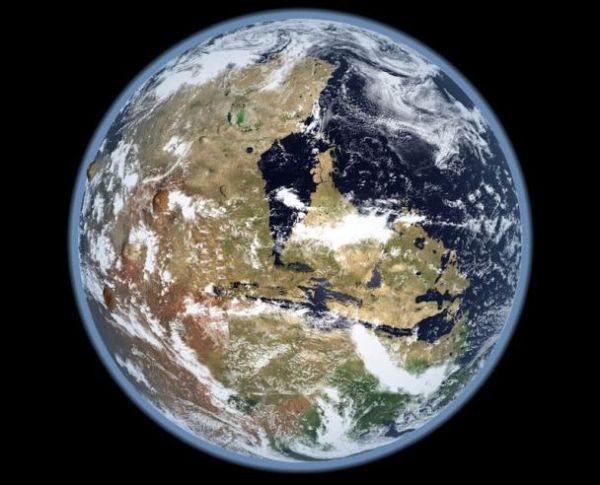Science
Related: About this forumBlue Mars

Kevin GillJan 2, 2013
A Living Mars
A conception of an ancient and/or future Mars, flush with oceans, clouds and life.
This is a view of the Western hemisphere with Olympus Mons on the horizon beyond the Tharsis Montes volcanoes and the Valles Marineris canyons near the center. The height of the clouds and atmosphere are largely arbitrary and set for the sake of appearance and coverage over the exaggerated terrain elevations (~10 times elevation exaggeration). The eye is about 10,000 km (~6,200 miles) from the surface.
more
https://plus.google.com/113761354606401247247/posts/K8RQu5xu3EH
Mars would have to have a lot of greenhouse gasses to keep that ocean from freezing, but it is a compelling image
Warren DeMontague
(80,708 posts)Imagine that.
It's entirely possible that early Mars was MORE hospitable for the development of life than Earth, at the time- which begs the possible question of whether or not we all started there and were blasted over here via meteorite.
Wounded Bear
(58,637 posts)I thought that was on reason Earth retained hers, along with it's larger size and gravity field, of course.
The solar wind rips away any atmosphere unless deflected by the magnetosphere, right?
Confusious
(8,317 posts)Size of the sun, closeness to the sun, size of the planet, composition of the atmosphere, presence of a magnetic field.
Venus has a huge atmosphere, but no magnetic field, it is however, the size of earth. The atmosphere is a huge amount of carbon dioxide with about the same amount of nitrogen that we have. It can hang onto nitrogen and oxygen (in n2 ond o2 form, like earth).
The heavier elements stick around, the lighter ones leave. It probably can't keep hydrogen or helium. It probably spews some of its atmosphere, carbon dioxide and nitrogen, out into space, but some might fall back. It also replenishes it.
Mars has somewhere about the quarter to an eighth the gravity we do and no magnetic field, so it lost a lot of atmosphere.
It has a hard time holding onto anything lighter then carbon dioxide. People say you could make it earth like, but that would require an energy input to replenish the atmosphere.
Some of the exoplanets discovered are so close to their suns that they blast atmosphere into space like a comet.